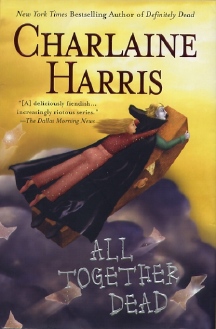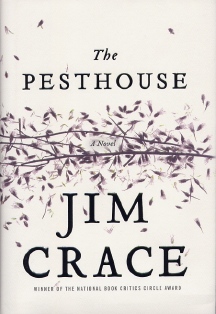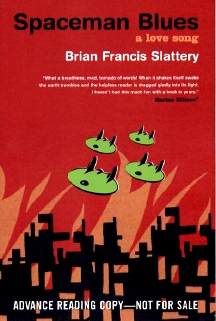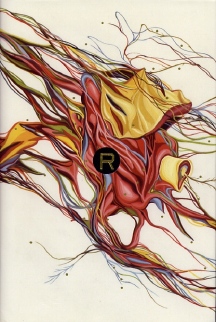|
|
|
|
This Just In...News
From The Agony Column
|
|
05-13-07: Preview for Podcast of Monday, May 14, 2007: "The murder, the atrocity, the
barbarity of the race being dug up out of the ground."
Here's an MP3
preview of the Monday May 14, 2007 podcast for The Agony Column.
Enjoy!
|
|
05-11-07: Charlaine Harris Proves Vampire Fiction Is Not
'All Together Dead'
|
Frightening Thoughts for a Friday
 |
|
| You'd
think that such a thing could never come to pass. |
As I was reading 'All Together Dead' (Ace / Penguin Putnam ; May 1, 2007
; $24.95) by Charlaine Harris, I had one of those horrific thoughts that
sometimes get stuck in your brain. Specifically, I was thinking of the
tradition of the Southern Gothic, and how it informs Harris's work, and
my mind skipped to thoughts of some of my favorite Southern Gothic novelists
from the old school days, Flannery O'Connor and William Faulkner. It
occurred to me that were they to be alive today, they would be quite
likely to be writing vampire novels. Think of it. 'As I Lay Dying' ....
and preparing to be resurrected. Hazel Motes, the undead preacher.
It's all very scary. What's even more frightening is the fact that Harris's
new novel, now on the NYT bestseller list, comes from a series that was
roundly rejected when she first submitted the first book, 'Dead Until Dark'.
Her editors, who were used to publishing mysteries, didn't know what to
make of it. Well, duh. Make it a bestseller, whydoncha?
The latest entry in the Sookie Stackhouse series has managed that feat
easily. In 'All Together Dead' Harris brings in all sort of topical
material to her vampire universe. Between 'Definitely Dead' and 'All
Together Dead',
well, Katrina happened and it's caused as many ripples in the vampires'
world as it has in ours. The Queen of Louisiana, on trial for the murder
of her husband, finds herself further reduced because New Orleans has
been swept away and doesn't seem to be coming back soon. Sookie has
taken up
with a were-tiger, Quinn, but before that romance can really get going,
she's swept away, to a vampire convention at a specially designed hotel
called the Pyramid of Gizeh. You can guess what it looks like and you
might even guess that once Sookie and the vampires bringing her along
arrive,
things don’t go smoothly.
Harris is a fascinating writer, mashing together all sorts of things
that don’t belong together as if they do and bringing it off
with no effort. Serious issues of terrorism and prejudice based on
sexual preferences slip
up on banana peel slapstick and heartless satire. But Harris pulls
this off by virtue of the absolute seriousness with which she takes
her characters
and her universe. She keep you amused and chilled and offers mysteries
that keep the tension thrumming. And while Harris has more than a few
serious thoughts on her mind, she's loath to bash you over the head
with them.
'All Together Dead' is a delightful kitchen sink novel that, while
it lacks a kitchen sink, offers so much more. Were-tigers? That's old
by now. The
new shiny is warrior women from another dimension. Think Conanettes.
Now that's scary.
|
| |
| |
|
05-10-07: Brian Francis Slattery Gets "Spaceman Blues'
|
Let Me Tell You About the Future
|
|
Damn
saucers, always clogging up the skies.
|
To begin with, the future officially began in the past. At the dawn of
the actual millennium according to a science fiction writer. That was
just about six and a half years ago, January 2001, to be precise.
Strangely enough, the future looked suspiciously like the present. It was
not noticeably cleaner. Damn, I always liked the clean futures, but then,
I'm sort of a neat freak. The future was neither terminally dire, nor was
it transcendently hopeful. It appeared, for all intents and purposes, to
be the present lumbering along a pace that could not be called dizzying,
unless you were keeping track of rising prices. Otherwise, pretty much
more of the same.
Having lived in the future for those six and a half long years, we've acclimatized.
At this point we're starting to think that another future is out there
ahead of this one, and damn, maybe it will be better. Clean! Shiny! Or
a grim wasteland filled with fast-running zombies and plenty of ammo to
take 'em down, the world transformed into one giant video game. Sweet.
In the interim, with lumbering pace still in place, the near future,
say, this summer, offers us 'Spaceman Blues: A Love Song" (Tor
/ Tom Doherty Associates ; August 2007 ; $12.95 / $21.95) by Brian
Francis Slattery.
Yes, it's another gods-damned book, and no, it does not involve vampires
or empires. 'Spaceman Blues' plunges us into the not-so-dire, nearly-dystopian
future that we're living in at this moment. It re-invents the present
in prose so that it seems like we're living in the science fiction
future
we actually inhabit but are too wrapped up in to notice. For readers
who love the language, who read for the sheer joy of having words
zip through
their brains like el-trains through the sleazy neighborhoods of New
York, well, 'Spaceman Blues' is the ticket. You will not need to
check your brain
at the door, though you might need to check it afterwards. It's still
there, I assure you. It's just been changed.
What will have effected this mental transformation is the reading
experience of 'Spaceman Blues', immersion in the peculiarly musical
prose of Brian
Francis Slattery as Wendell Apogee searches New Yorica for (and I'm
only going to type this once, so pay attention) Manuel Rodrigo de
Guzmán
González who has disappeared into the underground economy
of New York. And that's all the science fiction you need, because
in this
particularly
dull future, we have Slattery who uses language to set the present-as-future
on fire and make it readable. Make it addictive.
One can clearly hope that in this present-as-future, more publishers follow
Tor's admirable path in releasing this book (I believe) simultaneously
as a hardcover and trade paperback. For book geeks like me, this means
you have the TPB to read in the taqueria (and if ever there were a book
meant to be read in taquerias, this is that book), and a hardcover to wrap
up in Demco mylar for shelving and library storage. It also means that
those who want to be in on the hip and cutting edge but may not want to
drop more than twenty bucks can get the TPB in the first pass. I know,
it dilutes the sales figures (supposedly), but screw those stupid numbers.
I'm happy to see Tor just getting the book out and doing it right.
Slattery's interest in underground economies and his vision of their
existence in the present as a sort of science-fictional construct
makes even more
sense as you luxuriate in his language. So when you hear surreal
stories on NPR, for
example, this report from Jim Zarroli on Sudhir Venkatesh
and his investigations of the underground economy in New York, you
can be re-assured
that you're not probably not getting some stray electrons that have
wandered back from an improbable future and been sucked down into
your audio player.
It's Occam's Razor. The simplest explanation is the most likely.
You’re
not getting some transmission from an improbable future. You're living
in an improbable future. Your future is to be filled with a wild
night reading 'Spaceman Blues'. And after that? More days spent in
a present
which looks dishearteningly like the past, only with more crap and
trash strewn everywhere.
|
| |
|
05-09-07: A Review of 'Rant' by Chuck Palahniuk
|
Looping Literature
To my mind, 'Rant' is clearly Chuck Palahniuk's best novel. This is not
to say that it will be everybody's favorite Chuck Palahniuk novel; sentiment
comes as much into play when choosing favorites as does the quality rating.
Moreover, while the caliber of the writing in 'Rant' is high, the peculiar
factor is as well. Palahniuk's writing a faux oral history of a serial
killer. But Rant Casey is not your usual serial killer.
I suspect that hearing the novel described in the abstract, a certain
percentage of readers will expect (or hope for) something along the lines
of Seven,
the David Fincher serial killer movie made before that same director adapted
Palahniuk's 'Fight Club'. Surrender that hope. 'Rant' is something far
stranger, and it has more in common with Mark Z. Danielewski's 'Only
Revolutions'
or even Jonathan Lethem's 'You
Don’t Love Me Yet'. All three novels
mix musical motifs and literary techniques. Palahniuk's prose, in the paragraph
size nuggets demanded by the Oral History format he employs here, are every
bit as burnished and clean as Lethem's slick and smart pop-single-as-novel.
His enjoyment of literary looping and sampling techniques is reminiscent
those found of Danielewski's novel-length song.
But what is really going to knock the book out of the park for readers
is Palahniuk's use of science fiction literary techniques. In my interview
with him, he cited Philip K. Dick as an inspiration, but was unfamiliar
with 'Time Out of Joint', which effectively describes large portions of
'Rant' even if the plots are pretty different. Palahniuk is smart enough
of a writer to know what he knows and use it well. For a rookie SF writer,
he does a good job of avoiding the pitfalls and minefields that often ensnare
the literati who decide to explore genre fiction. Of course, Palahniuk
isn’t writing genre fiction because he thinks it's easy. Frankly,
it's the only way he can get to some of ideas he's interested in playing
around with.
He told me that 'Rant' is the first novel in a science fiction trilogy.
The next novel will come out in two years, and follow the exploits
of one of the narrators of 'Rant'. How it will do so is a question
I'm really
looking forward to seeing answered in print. In between trilogy entries,
he'll be releasing a couple of "more appalling" novels. His
description – as
if 'Rant' were not appalling enough. I suppose that it isn't, though
it's chock-a-block with enough grotesquerie to make even aficionados
of the
gross-out flinch. But sit down read 'Rant' and you'll find an intricately
constructed novel that is for all the bodily fluids, brilliantly well-written.
|
| |
|
05-08-07: Jim Crace Enters 'The Pesthouse'
|
Trust in the End
 |
|
| "Life
is a disease which is always mortal." Italo Svevo |
Jim Crace does not seek to inhabit no-man's land. He doesn't try to dislocate
his work from the reality we know. But once he sets a novel in motion
it rarely seems to end up in the world within which it began. His steps
away from reality are measured, focused on the immediacy of experience.
In Crace's work, we are nowhere if not in the moment.
His new novel is 'The Pesthouse' (Nan A. Talese / Doubleday ; May 1, 2007
; $24.95), and the moments we experience begin in a future separated from
the present by an unknown number of years. The gulf of time cannot matter
to Franklin and Jackson Lopez, brothers scrabbling across an America that
has been stripped of civilization. Franklin and Jackson are headed east,
to a land of shining hope, to Europe. On their way they stop at Ferrytown,
where they meet Margaret, fresh from the Pesthouse, having sweated out
disease, at least of the body. Together, they head east. Towards hope.
Crace doesn't dwell on the particulars of how the world of today was transformed
into his yearning wasteland. Instead, the particulars of getting from one
day to the next, from one person to the next, are the details that drive
the narrative and envelop the reader. We are simply told that the machines
have stopped, a nice nod to E. M. Forster, another British literary icon,
best known for Merchant-Ivory adaptations like 'Howard's End', but whose
first short story was a powerful tale I read aeons ago in a the same Groff
Conklin anthology that introduced me to H. P. Lovecraft. "The Machine
Stops". Indeed.
In 'The Pesthouse', America has been upended, according to the author,
who decided to conduct a thought experiment to, "...simply reverse
America's position in the world and stick it to the bottom of the pile,
give it a medieval future instead of one swaggering with wealth and technology
and power. That was the starting point of The Pesthouse. I had no idea
where it would lead me."
Where indeed it does lead the author is a journey into the characters
of those left behind as they struggle eastward. And those characters
find
themselves involved in a love story that will explore the darkest
corners of the shattered remains of Our Great Country in order to find
the best
and the brightest parts of themselves. This is what happens when
America is scoured clean by time, burnished and reborn amidst its own
ashes. Crace
has a deft, even hand, evinced by a surprisingly light touch. The
novel is richly atmospheric with the feeling of an endless fall evening.
We're
hundreds of years past the twilights of our lives. Our future, alas,
bears more of a resemblance to our past than our present. But that's
the good
news. With the self-destruction of our dystopian present, something
new can emerge. Something better. We're entering a new era for science
fiction
literature as well. With 'The Pesthouse' and the Cormac McCarthy's
'The Road', we're finding a literary understanding of genre elements
that has
never been so allusive as some might have thought. E. M. Forster
understood. The Machine Stops. But humans do not.
|
|
05-07-07: A 2007 Interview With Chuck Palahniuk
|
"Show it that you are not its bitch."
|
|
|
Palahniuk
above, Rant below.
|
Ayup. That'll show 'em. You take yourself one bitchun car, drive it till
it is destroyed, you've showed it all right. It's probably because I'm
not that sort of fellow that I find Chuck Palahniuk's vision of automotive
apocalypse so appealing.
No, I'm the guy who buys an anonymous sedan brand new and drives it until
it disintegrates beneath me. That whole "live fast, die young" perspective
is a lot easier to take when you're young. Past the precious years of
youth, when you find, as both Chuck Palahniuk and I do, that the apple
don't fall so far from the tree, your resemblance to your father is no
easier to deal with, but it's no spur to self-extinction either. Was
it only like, four, maybe five years ago, that Palahniuk told me that
he was deliberately setting out to write horror genre fiction? He's done
that with three admirable titles to his credit; 'Lullaby',
'Diary' and
'Haunted'. And
though you might think his latest, 'Rant', being the story of serial
killer, is another addition to this horror canon, you'd be
surprisingly wrong. This time around he told me that he's working on
a trilogy of wait for it, science fiction novels, with standalone works
coming between them.
And he told me so much more, much of it broadcastable on public radio.
Like the word "friggin", which you'll encounter in his latest
novel. Of course, much of 'Rant' is not the sort of thing you’d
want to bring up round the family dinner table, even though family dynamics
play a big part in the proceedings. And parts of this interview shall
not broadcast on radio anytime soon either. I was going to ask my manager
at the station is ... a certain word is broadcastable ... but frankly,
I'd be too embarrassed to do so. And that would please Palahniuk no end,
who declares herein both the MP3 and the RealAudio versions of the interview
that he's planning on including cringeworthy material in everything he
writes, ever. I think that's a promise we can count on him to keep, and
what keeps me, at least coming back. Finally, a literary author who understands
the power of embarrassment.
|
| |
|
|




